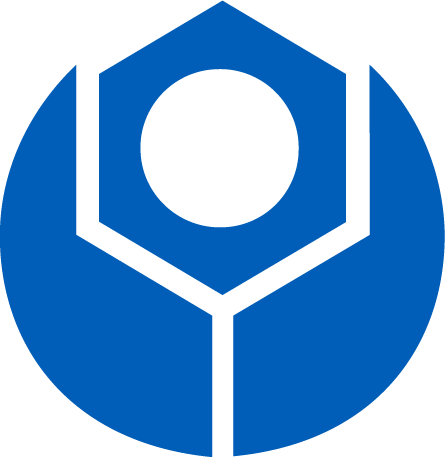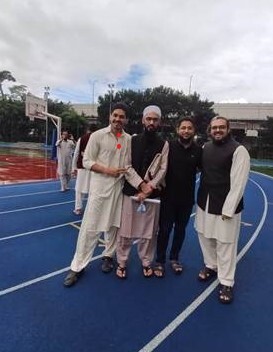

Ahmad bin Arshad from Islamabad, Pakistan, graduated with a Master's degree from the Department of Mechanical Engineering in 2021. In the same year, he joined Micron Memory Taiwan, located in the Houli District of Taichung as a Product Integration Engineer. He describes his work as being "a bridge between design, fab, and assembly". Recently, Ahmad is mostly involved in technology development for PCDRAM in terms of risk analysis for future technodes.
What were your reasons to come to Taiwan for study?
There were two major reasons why I chose Taiwan as a destination for my graduate studies: When I gained my bachelor’s degree from the Pakistan Institute of Engineering and Applied Sciences (PIEAS) in the field of mechanical engineering, I realized that many fields in mechanical engineering were reaching maturity levels and would soon be replaced by automation. Most industries are currently undergoing tremendous changes due to increasing automation, and I wanted to move into a “future-proof” direction. Thus, may plan was to upgrade my skills in a new field that I deem as essential for the next decades, i.e. artificial intelligence and Additive Manufacturing. In Asia, two countries are leading this field, South Korea and Taiwan. And as Taiwan Tech came first to accept my application, and also offered an attractive scholarship, I didn’t hesitate for long.The second reason was, that I wanted to experience Asian culture, but in a free, democratic country with an open society. For me, that was equally important. Taiwan is one of the few countries in Asia that offers both, top-quality education in technology and a political system that is in line with my values.
Why did you decide to continue your career in Taiwan after you graduated from the Taiwan Tech?
I was considering to go for a PhD, and actually had already received offers for PhD programs from two universities, University of Melbourne, and University of South Florida. But, it was also attractive for me to gain work experience in Taiwan’s semiconductor industry, the most advanced in the world. So, I also applied for positions in the industry, and I was very happy to be offered this position with Micron. It was a bit unexpected, because companies are usually looking for PhD graduates for such a research-intensive field. It is a bit unusual to join the company with a master’s degree, but due to the current high demand of qualified personnel, master’s graduates are also accepted.
Did you feel well prepared to enter the industry when you graduated from Taiwan Tech?
Yes and no. Taiwan Tech is certainly a university with close ties to the high-tech industry, and the professors are keeping abreast of the latest developments. But the semi-conductor industry is kind of a “secretive”, self-contained industry, so most of the knowledge and skills that I need for my current work were not taught in my university classes. When I entered Micron, my supervisor gave me 2000 pages of materials and documents that I had to go through. The first three months with Micron felt like a continuation of my studies without being a student any more. It was quite tough. Even after a year, I am still learning new stuff every day.
How about adapting to Taiwan culture and student life on Taiwan Tech campus?
The most difficult part for me was certainly the food. It is not easy to find Halal food in Taiwan, and Taiwanese cuisine is not really appealing to Pakistani taste buds. We are used to spicy, flavored food, and we would much prefer to cook ourselves, but Taiwan dormitories or one-room apartments usually don’t have a kitchen. I have to say that Taiwan Tech has put a lot of effort in accommodating to Muslim students needs by arranging for Halal food eateries in the student cafeterias, and by offering an on-campus prayer room. However, equipping all dormitories with cooking areas would probably be the biggest improvement for the life of Muslim students.
Which advice would you give to fellow international students and graduates of Taiwan Tech?
 I think for students it is very important to find the right advisor for your Master’s thesis. It is not only that you have to find someone who does research in the field that you are interested in, you also have to get along well with your advisor on a personal level. I am very grateful to my advisor, Professor Jeng-Ywan Jeng, who is a very kind man and an excellent academic advisor. As for job-seeking in Taiwan, I can only recommend to learn Chinese. With sufficient Chinese skills, your chances on the local job-market will vastly increase. However, the good thing is that there are also quite a few international companies in Taiwan, like Micron, where the working language is English.
I think for students it is very important to find the right advisor for your Master’s thesis. It is not only that you have to find someone who does research in the field that you are interested in, you also have to get along well with your advisor on a personal level. I am very grateful to my advisor, Professor Jeng-Ywan Jeng, who is a very kind man and an excellent academic advisor. As for job-seeking in Taiwan, I can only recommend to learn Chinese. With sufficient Chinese skills, your chances on the local job-market will vastly increase. However, the good thing is that there are also quite a few international companies in Taiwan, like Micron, where the working language is English.
What are your career plans for the future?
I want to continue working in my current position in the chip manufacturing field. If I hadn’t found this position in R&D, I would have left for PhD a long time ago. The semiconductor industry is a highly specialized niche, and there are only a few countries in the world where you can find adequate positions - it can hardly get better than what I am doing now. In hindsight I may say, that initial expectations on my studies and my career in Taiwan were exceeded by far, so I can only say that coming to Taiwan was the right choice!